Commentary on 1 Kings 8:37
Verse: "If there be in the land famine, if there be pestilence, blasting, mildew, locust, or if there be caterwaulings; if their enemy besiege them in the land of their cities; whatsoever plague, whatsoever sickness there be:" (1 Kings 8:37)
Introduction
This verse comes from Solomon’s dedication of the Temple in Jerusalem, a significant event in the history of Israel. The context highlights the importance of prayer and supplication to God during times of crisis. In this commentary, we will explore interpretations and applications from some renowned public domain commentaries, including those of Matthew Henry, Albert Barnes, and Adam Clarke.
Historical Context
The historical context surrounding 1 Kings 8 is paramount for understanding its implications. Solomon has just completed the construction of the Temple, signifying God’s enduring presence with His people. The dedication ceremony serves as a poignant reminder of Israel’s covenant relationship with God, where prayer and repentance are essential in times of national calamity.
Henry emphasizes that this verse reflects the natural calamities and adversities that can befall a nation. Solomon asks God to hear the prayers made in this Holy place, underscoring the Temple’s role as a mediator between God and the people.
Prayer during Calamity
Solomon enumerates various calamities—famine, pestilence, locusts, and other afflictions—representing the comprehensive nature of human suffering. Barnes notes that these troubles signal not only physical suffering but also spiritual desolation, as Israel’s fortunes are intertwined with their fidelity to God.
Furthermore, Adam Clarke elaborates on the consequences of disobedience and sin that often result in national disasters. He posits that calamities serve as God’s call to repentance, reminding the faithful of their reliance on divine mercy.
The Nature of God’s Response
The verse implies that God’s attention is drawn to the collective cries of His people. Commentators agree that it is crucial to note that the response from God to prayer encompasses both mercy and discipline. Henry highlights that while calamity may strike due to sin, prayer and genuine repentance can restore the broken relationship between God and His people.
Also, Clarke states that God's promises to hear and respond are founded upon the conditions of humility and repentance. Thus, Solomon’s prayer reflects a deep understanding that adversity is an opportunity for growth and returning to God’s favor.
Applications for Today
This passage resonates with modern readers who face various forms of calamity—be it relational, economic, or health-related. The practicality of Solomon’s request remains relevant, as it encourages individuals and communities to seek divine intervention during times of distress.
- National Crises: As nations encounter famine or disease outbreaks, believers are called to intercede for their countries, much as Solomon prayed for Israel.
- Repentance and Humility: The call to acknowledge sins collectively aligns with the biblical model of confession, which is essential for receiving God’s grace and mercy.
- Community and Individual Spirituality: The importance of communal prayer strengthens the believer's relationship not just with God but also with each other, fostering a spirit of unity in facing challenges.
Conclusion
1 Kings 8:37 serves as a reminder of God’s responsiveness to the cries of His people amidst crises. The insights drawn from Matthew Henry, Albert Barnes, and Adam Clarke enrich our understanding of prayer and divine intercession. In reflecting on this verse, pastors and theologians are encouraged to guide their communities toward continued faithfulness, especially during tumultuous times, embracing the model of intercession set forth by Solomon.


